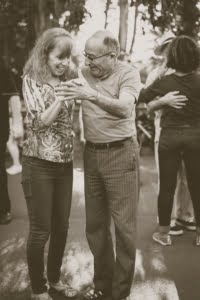The natural progression of time means we inevitably grow older if the Lord in His grace gives us many years of life. Depending on your goals, how you’ve been socialized, and the messages that we receive about getting older, it may be a welcome development to grow older.
While some cultures celebrate old age, cherishing the elderly and the life wisdom they’ve accumulated, others seem to look at aging as something to avoid and push off for as long as possible. Aging, however, is an inevitable process that is part of living in this world under the sun. What does it look like to age successfully?
What is Successful Aging?
 There are different ways to think about what success looks like when it comes to aging. Depending on how we define “success,” it has an impact on what people will strive toward in their own lives as well as the programs a given society will put in place to support its senior citizens. Some expectations may be unrealistic, and so unhelpful. So, a lot is riding on what we think aging should look like in its ideal form. San Diego Christian Counseling can provide guidance on navigating these expectations.
There are different ways to think about what success looks like when it comes to aging. Depending on how we define “success,” it has an impact on what people will strive toward in their own lives as well as the programs a given society will put in place to support its senior citizens. Some expectations may be unrealistic, and so unhelpful. So, a lot is riding on what we think aging should look like in its ideal form. San Diego Christian Counseling can provide guidance on navigating these expectations.
There are at least two ways of defining “successful aging.” One older theory says that successful aging looks like having high physical, social, and psychological function in old age without the impedance of major diseases or disability. In other words, according to this theory, “success” in terms of aging has three main components:
- the absence or avoidance of disease and risk factors for disease.
- maintenance of physical and cognitive functioning.
- active engagement with life, including maintaining autonomy and social support.
Occasionally, some videos of ninety-something year-olds doing amazing things like lift weights or dancing, go viral on social media, shocking younger people who struggle to accomplish similar feats. Those octogenarians and nonagenarians would likely be the exemplars of this theory.
They are in good physical condition, don’t have any obvious physical ailments, and seem to be living their best lives even at this stage. Aging well thus looks like being able to do in your eighties what you could when you were much younger.
 This picture of aging sounds great, but it certainly feels like a remarkably high bar. For many people, when they are in their forties they already aren’t as limber and spry as they were in their teens, even if they’ve led an active and healthy life. This first theory of successful aging doesn’t seem to apply to everyone.
This picture of aging sounds great, but it certainly feels like a remarkably high bar. For many people, when they are in their forties they already aren’t as limber and spry as they were in their teens, even if they’ve led an active and healthy life. This first theory of successful aging doesn’t seem to apply to everyone.
To employ a term used by some authors, the older adults who experience excellent physical fitness unmarked by cognitive or other declines are “lucky agers.” Those who possess these great physical, mental, and social capacities aren’t representative of most elderly people.
Perhaps successful aging should be defined in another way that captures a more representative and realistic perspective on the aging process. While drawing on some of the good points of the first theory, perhaps there’s another way.
According to this second school of thought, perhaps successful aging looks more like having the capacity and tools for coping well with impending or existing challenges such as:
Loss: For example, the death of a spouse, relatives, and friends in the same age bracket. Loss can also encompass older children moving further away and losing regular contact with them and the grandchildren.
Illness: Chronic conditions that set in with old age, or simply not being able to recover as quickly from ailments
Diminishing person-environment fit: For example, when the house becomes too large when the kids move out or a spouse dies. This also occurs when a house has steep stairs that are harder (and more dangerous) to navigate, or a house that needs substantial maintenance requiring physical stamina.
To adjust to these changes that life inevitably brings, one needs the flexibility to be able to change tack if needed to try new things. Sometimes people get stuck in one way of doing things, and so when circumstances shift, they can’t cope with the new situation.
For those who can cope and find ways to adapt, they can still find satisfaction, a sense of meaning, and the ability to participate in meaningful and treasured activities even in those new circumstances. “Aging well” thus looks more like being able to handle the typical vicissitudes of life that come with getting older while retaining meaning to life than it does doing life as a younger person would.
Strategies to age successfully
These two theories about aging well can provide us with guidelines to age successfully. One wants to be able to adapt to situations as they arise, but beyond corrective actions, we can also be proactive and head off potential stressors and challenges before they arise.
Some of these strategies can thus be implemented while younger to enter later life better prepared, but some of these strategies can be implemented later in life to address issues that diminish adaptability and overall satisfaction with life.

On the one hand, while being free of disease or in peak physical and cognitive condition isn’t the norm for most older people, there are steps one can take to be healthy. Certainly, being healthy is better than not, and if any steps to mitigate the effects of old age can be taken, surely one should take those steps.
And so, implementing appropriate calorie and nutrient intake and physical exercise as directed by a physician will lead to greater overall satisfaction and greater enjoyment of simple things like playing hide and go seek or giving piggy-back rides to the grandkids. For instance, eating certain foods such as Omega-3 rich foods has benefits for heart health and blood pressure.
Additionally, having social support such as friends and family around helps in coping with the various losses that attend getting older. In many non-Western cultures, the elderly are taken care of within the family, and so they don’t feel disconnected from their embedded network of care.
Getting cognitive stimulation through reading, writing, and playing games like chess is also important. Reducing stress through exercise is good for your overall health (including your heart health) and giving you the capacity for other stressors that may come your way.
Knowing your limits allows you the flexibility of changing your routines when they aren’t working anymore. If your home environment is no longer conducive to your safety, for example, being open to interdependence by communicating your needs to your family and enrolling in an “aging in place” program or joining an assisted care facility allows you to continue living life, but with the support you need.
 Appreciating your milestones and aging gracefully as you accept the changes to your mind and body enables one to face the reality of aging head-on. Our perspective on getting older can make the process more painful than it needs to be. Proverbs 17:6 says, “Children’s children are a crown to the aged, and parents are the pride of their children”, and this is true of physical and spiritual children.
Appreciating your milestones and aging gracefully as you accept the changes to your mind and body enables one to face the reality of aging head-on. Our perspective on getting older can make the process more painful than it needs to be. Proverbs 17:6 says, “Children’s children are a crown to the aged, and parents are the pride of their children”, and this is true of physical and spiritual children.
In another passage, Proverbs 20:29 says, “The glory of young men is their strength, gray hair the splendor of the old”. Instead of trying to turn the clock back, having gray hair and grandchildren are splendors and milestones to celebrate. Welcoming the changes aging brings plays a large part in whether a person is positioned to cope with some of those changes.
You still have a purpose, and as a pastor named John Piper wrote, “don’t waste your retirement.” Our society is tied so closely to this idea of the 9-to-5 job being the crux of our purpose.
But if our purpose as humans is to enjoy God and bring glory to Him in everything we do, including those 9-to-5 jobs, even when those jobs (whether in corporate spaces or at home) end, that just opens up other avenues to continue enjoying and glorifying God.
As Psalm 92:12-15 says, “The righteous…will flourish in the courts of our God. They will still bear fruit in old age, they will stay fresh and green, proclaiming, ‘The Lord is upright; he is my Rock, and there is no wickedness in him’.” San Diego Christian Counseling supports this mission .This work of proclaiming God’s goodness never ends; godly wisdom can continue to be shared throughout the years, and always needs to be proclaimed to the next generation.
It’s not just individuals that need to shift their view of aging to have a healthy outlook on that process. The society also needs to adjust its perspective on the aging process and provide better support structures and policies that create space for older adults to remain socially connected and physically active.
“Grandpa Time”, Courtesy of Johnny Cohen, Unsplash.com, CC0 License; “Dancing Couple”, Courtesy of John Moeses Bauan, Unsplash.com, CC0 License; “Sitting With Grandma”, Courtesy of Sounak Mondal, Unsplash.com, CC0 License; “Grandma”, Courtesy of BBH Singapore, Unsplash.com, CC0 License


